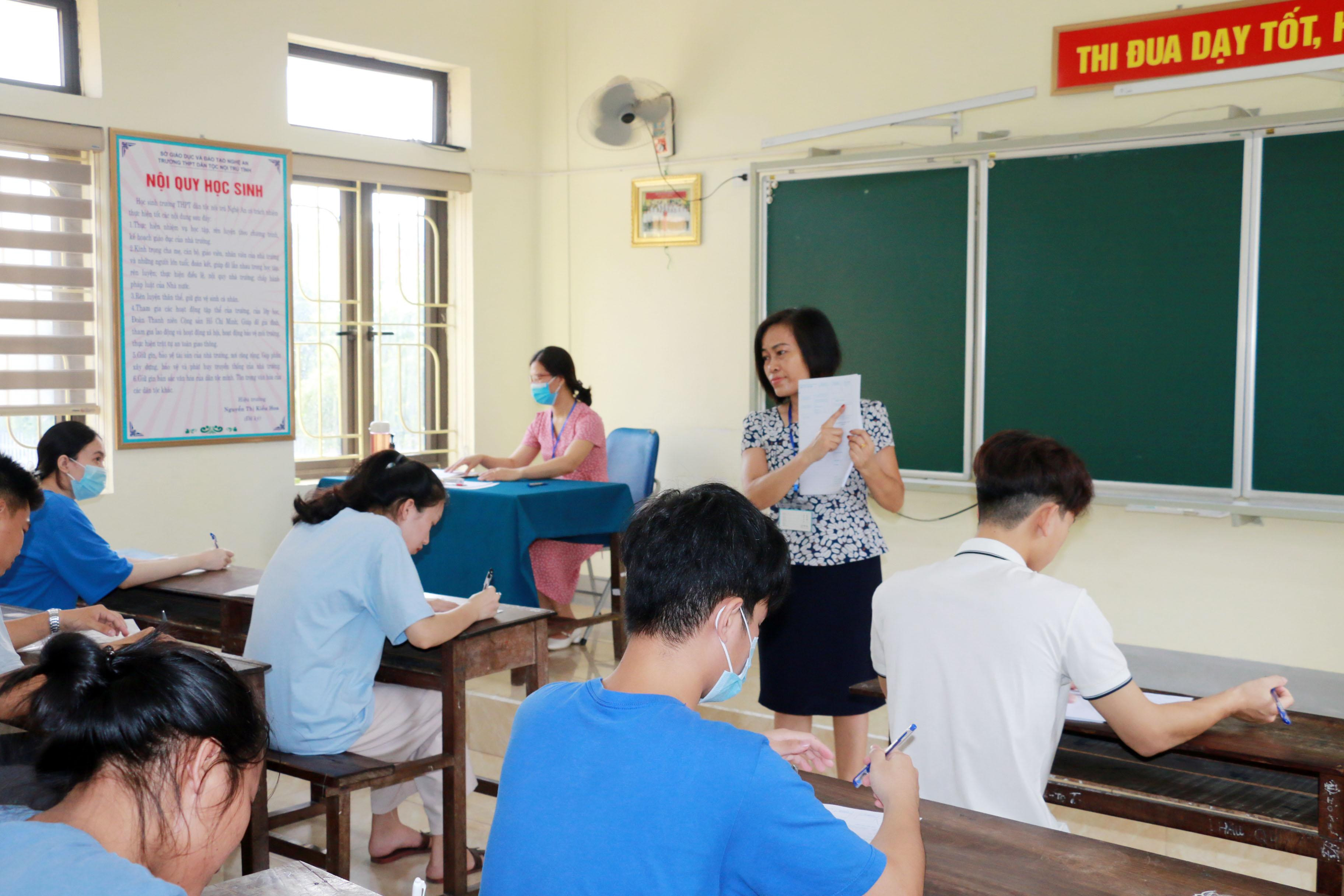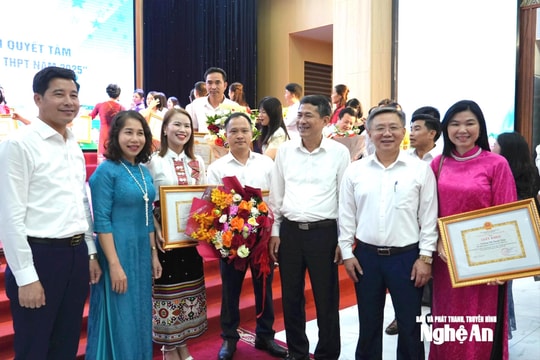High School Graduation Exam 2025: Same questions, same exam period, how much autonomy do provinces have?
According to experts, the draft of the high school graduation exam from 2025 of the Ministry of Education and Training has decentralized and delegated more power to localities, which is completely correct.
According to the draft plan for organizing graduation exams from 2025, the Ministry of Education and Training will provide general direction, promulgate regulations and guidelines for organizing the exam; build a question bank and create exam questions to provide to localities organizing the exam; regulate the general exam schedule; inspect and examine the organization of exams and consider recognition of high school graduation.
Localities will direct, organize exams and consider recognizing high school graduation; inspect, check, and supervise the organization of exams and consider recognizing high school graduation in the locality according to the Ministry's general exam schedule.
Meanwhile, over the past 8 years, the organization of high school graduation exams has also changed in the direction of gradual decentralization to localities. Specifically, in the period from 2015 to 2019, the roadmap for gradual decentralization to localities was implemented from 2 exam clusters in 2015 and 2016 to 1 exam cluster from 2017 in each province, chaired by the Department of Education and Training, and coordinated by universities and colleges.
Since 2020, the high school graduation exam has been chaired and fully responsible by localities, while higher education institutions have mainly participated in inspection, examination and supervision activities. This decentralization has proven effective, promoting autonomy, self-responsibility and increasing the initiative of localities.
Is it necessary for localities to decide on their own?
Over the years, Ho Chi Minh City has repeatedly asked to self-determine graduation. Seven years ago (2016), during a meeting with the then Minister of Education and Training, Mr. Phung Xuan Nha, the Ho Chi Minh City Department of Education and Training proposed specific mechanisms, including the proposal to delegate authority to centrally-run provinces and cities to conduct testing, evaluation, and recognition of high school graduation.
Accordingly, the Ministry of Education and Training will periodically organize assessments of the educational quality of provinces and cities according to international standards (PISA, PASEC, etc.) and announce them nationwide.
At the same time, high schools are proactive in adjusting the teaching time of subjects on the basis of ensuring knowledge and skills standards, proactively building integrated and interdisciplinary teaching programs and diversifying assessment and evaluation to suit the actual teaching situation in each type of school, including specialized schools, modern advanced schools, etc.
 |
| Students in Ho Chi Minh City. Illustration photo: Thanh Tung |
In 2018, at an online conference, the Department of Education and Training of Ho Chi Minh City continued to propose this issue. In 2021, in the report on the implementation of Resolution 16 and Resolution 54, the Department of Education and Training of Ho Chi Minh City once again proposed to apply a special mechanism. This Department continued to express its desire for the Ministry of Education and Training to delegate authority to provinces and cities to conduct assessment and recognition of high school graduation.
Most recently, the proposal for autonomy was put forward by the Department of Education and Training in the draft Report on the development of education and training in Ho Chi Minh City for the period 2021-2025 and vision 2030. In which, the Department of Education and Training recommended that the Ministry of Education and Training assign the People's Committee of Ho Chi Minh City to take full responsibility for directing the implementation of all stages of organizing exams and recognizing high school graduation in the locality.
The exam questions are developed by the Departments of Education and Training according to the regulations of the exam and ensure the correct structure and format of the exam questions issued by the Ministry of Education and Training.
Gradually decentralizing more power to the local level is appropriate.
According to Mr. Le Truong Tung, Chairman of the Board of Directors of FPT University, the exam is stable and should not be left to the local authorities to decide. The draft graduation exam plan after 2025 is clear because what you study is what you test and there are still 6 subjects.
But for students to have the best comprehensive learning, the three core subjects of Literature, Math, and Foreign Language are stipulated, and the remaining three subjects will be stipulated in the middle of the second semester every year. Regarding the decentralization and delegation of authority to organize the exam, it remains the same, that is, the questions are organized by the Ministry and locality.
Regarding Ho Chi Minh City's proposal to let localities decide on the organization of graduation recognition exams, Mr. Tung said: "Perhaps it is not necessary, because the organization of exams like this is fine and does not need much change."
 |
Students of the Provincial Ethnic Minority High School attend the 2022 High School Graduation Exam. Photo courtesy of My Ha |
Regarding the issue of computer-based testing, according to Mr. Tung, it is necessary to prepare very carefully because it involves the majority. Localities and regions that find it good will pilot it first. Regarding the new program that is oriented towards assessing students' abilities but testing by separate subjects, it is only necessary to adjust the test questions accordingly.
The goal of the graduation exam is also to "serve as a basis for evaluating the quality of teaching and learning in high schools and the direction of educational management agencies" (graduation exam regulations), so using the same exam questions of the ministry is necessary.
Mr. Nguyen Van Ngai, former Deputy Director of the Department of Education and Training of Ho Chi Minh City, said that if we look at the proposal of Ho Chi Minh City frankly, at this time Ho Chi Minh City has enough conditions, capacity and experience to be autonomous in considering and recognizing high school graduation for 12th grade students studying in Ho Chi Minh City (including high school students and students of the cultural supplementary system).
However, Mr. Ngai believes that the Department of Education and Training of Ho Chi Minh City should not do this because it could create a disadvantageous situation for students studying in Ho Chi Minh City. The first reason, according to Mr. Ngai, is that many universities still use the method based on the results of the high school graduation exam as one of the methods to select students for their school.
 |
Candidates listen to the 2022 High School Graduation Exam Regulations. Photo courtesy of My Ha |
The second reason is that when students go to study abroad, a diploma based on the results of a local exam is not necessarily considered as important or equivalent to a diploma obtained by a central exam (Ministry of Education and Training) organized for the whole country.
Therefore, instead of asking for autonomy in reviewing and recognizing high school graduation, the Department of Education and Training of Ho Chi Minh City should propose that the Ministry of Education and Training decentralize the review and recognition of high school graduation to each province/city under the direction, inspection, supervision of the Ministry. Any province/city with difficulties should report to the Ministry of Education and Training for specific guidance and assistance.
On the part of the Ministry of Education and Training, through the national high school graduation exam as in the past and present, the Ministry can grasp the process, quality of education, management, and learning results of students nationwide and in each province/city to have appropriate direction and adjustment according to the central government's general policies and orientations.
The Ministry should strengthen and organize inspection and examination work more regularly throughout the organization and implementation of teachers' teaching and students' learning in each locality to promptly encourage and reward good performers; and correct, help, and handle areas with limitations or violations.
Mr. Ngai affirmed that he basically agreed with the draft announced by the Ministry of Education and Training. In particular, the draft has oriented to gradually decentralize more to provinces/cities in organizing graduation exams.
The Ministry of Education and Training will provide general direction, promulgate regulations and guidelines for organizing the exam; build a question bank and create exam papers to provide to localities organizing the exam; regulate the general exam schedule; inspect and examine the organization of the exam and consider the recognition of high school graduation.
It is completely appropriate for localities to direct, organize exams and consider recognizing high school graduation; inspect, check, and supervise the organization of exams and consider recognizing high school graduation in localities according to the Ministry's general exam schedule.
Currently, the Ministry has strongly and clearly decentralized the organization of high school graduation exams to localities. Localities, specifically the People's Committees of provinces/cities, are primarily responsible for organizing the exams in their areas.
The Ministry of Education and Training is responsible for issuing regulations, developing exam questions, and conducting inspections, checks, and supervision. In recent exams, especially in 2020, 2021, and 2022, this model has recorded many advantages, with increasingly specific decentralization and clear responsibilities.
As we know, there are currently differences between provinces and cities, from the capacity to create exam questions to the organization of assessment and construction of questions, while ensuring uniformity in quality, universality and similarity between localities is something that needs to be done carefully and with a roadmap.
To ensure consistency, the Ministry is still responsible for issuing examination regulations, creating exam questions, and conducting inspections and checks; other tasks are completely proactive and responsible for the localities. The Ministry will continue to focus on perfecting regulations and rules and conducting inspections and checks at both the Ministry and local levels so that the exam results are safe, objective and transparent.

.jpg)


.jpg)



